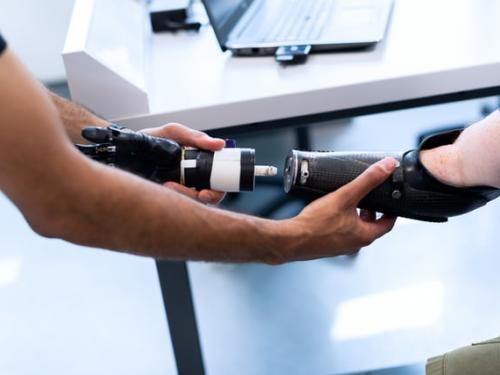
A biomedical science degree (BSc. Hons) enables graduates to pursue careers in NHS pathology centres, forensic science laboratories, research institutions and pharmaceutical industries. It is a qualification that can open doors to roles in healthcare and offers an excellent alternative to standard medicine degrees. Biomedical scientists study how cells, organs and systems operate in the body. It is an exciting and dynamic area that is highly relevant to fighting human diseases. Most people in this field find work in academic, industrial or clinical laboratories or use their transferable skills in other scientific careers. A significant number go on to study medicine. You'll need to be registered with the Health and Care Professions Council (HCPC) to work as a biomedical scientist in the UK.
What are the university entry requirements for Biomedical Science degrees?
To apply to universities for Biomedical Science, you should have, or be working towards achieving, a relevant Access to HE Diploma in Health Science or 3 A Levels with at least one in a pure science (Biology, Human Biology, Physics, Chemistry, Maths). Universities publish their particular entry requirements on the UCAS (Universities and Colleges Admissions Service) website. With the A Level route, you are usually expected to have a minimum of 5 GCSEs.
With the Access to Biomedical Science route, you are usually only required to have GCSEs in English and Maths at Grade C or above. Access to HE Diplomas are normally aimed at adults 18+ returning to education or wishing to change to a new career. There are no upper age limits. The Diploma qualification is viewed as being equivalent to 3 A Levels. Access to HE can be studied from home via online learning with Academy Online Learning.
There are many websites that track university performance in all subject areas. Students are encouraged to research carefully which university has a good track record in the particular degree course they are interested in. It is also worth looking into the department that you are applying to and see what facilities are available, what sort of placements are on offer and the student satisfaction rate for each degree course.
Enrol on an Access to HE course now
What do Biomedical Scientists do?
Biomedical scientists usually work in a laboratory, testing and analysing samples of blood, fluids and tissue. Most will specialise in one or two areas, such as infection sciences, blood sciences and cellular sciences. As well as working in laboratories, biomedical scientists can be employed by private and public sector hospitals, forensic and medical research institutes, local and central government health authorities, and academic institutions. They test and screen for diseases like hepatitis and leukaemia. Biomedical scientists also analyse blood to detect abnormalities like anaemia. They also support the blood transfusion and transplant service through blood grouping and matching.
What personal attributes are needed to become a Biomedical Scientist?
-
-
- Attention to detail and be able to focus and concentrate for extended periods of time
- An inquisitive approach to problem-solving
- The ability to empathise and be understanding when dealing directly with care users
- The ability to monitor and supervise the work of junior lab staff
- The ability work as part of a team
-
What are the pay and working conditions like?
-
-
- Starting salaries for qualified Biomedical Scientists range from £25,655 to £31,534 (Band 5)
- With experience, they can expect to earn between £32,306 to £39,027 (Band 6)
- Highly experienced employees in this field can earn from £40,057 to £53,219 (Band 7/8a)
- The Government has recently announced an increase in salaries across health sector employees over the next 3 years.
-
Biomedical scientists typically work 37.5 hours a week, which may include evenings, nights and weekends. Cost of living payments are added for workers in some parts of the country. On-call allowances and overtime payments are paid in addition to the basic salary.
Did you know?
-
-
- With a degree in Biomedical Science, you could go on to specialise in areas as diverse as genetics, immunology or even patent law.
- There are currently over 22,000 biomedical scientists working in the UK.
- As one of the most important cogs in the healthcare system, biomedical scientists will always be in demand in both the NHS and the private sector.
-
How is the degree funded?
Studying to become a Biomedical Scientist allows you to apply for the standard student support package in the form of a student loan. Scholarships, bursaries or grants may also be available for example, through the university or your place of work.
If you would like to complete an online Access to Biomedical Science course to obtain the qualifications for entry into a Biomedical Science degree at university, please choose your payment options below or contact us for more information. Studying and achieving this qualification provides a flexible way of achieving as it is fully online and recognised and accepted by UK universities.
Price Options
The cost of the Access to Higher Education Diploma (Health Science Professions) and the Access to Higher Education Diploma (Business) are £1320, and can be paid in monthly instalments from £110 per month over 12 months with 0% interest. Or discounted price at £1270 (£50 saving) when paid in full upfront.
Monthly Payment |
Cost/ Month |
Total* |
|---|---|---|
Pay in full |
Pay in full
|
£
|
- |
- |
- |
12 Months |
£110 |
£1320 |
11 Months |
£120 |
£1320 |
10 Months |
£132 |
£1320 |
9 Months |
£146 |
£1320 |
8 Months |
£165 |
£1320 |
7 Months |
£188 |
£1320 |
6 Months |
£220 |
£1320 |
* Includes £150 registration fee and certification with our awarding organisation, Skills and Education Group Access
For an instalment plan that works for you, visit our:
>>> STORE PAGE >>>
0161 726 5970
for more information


